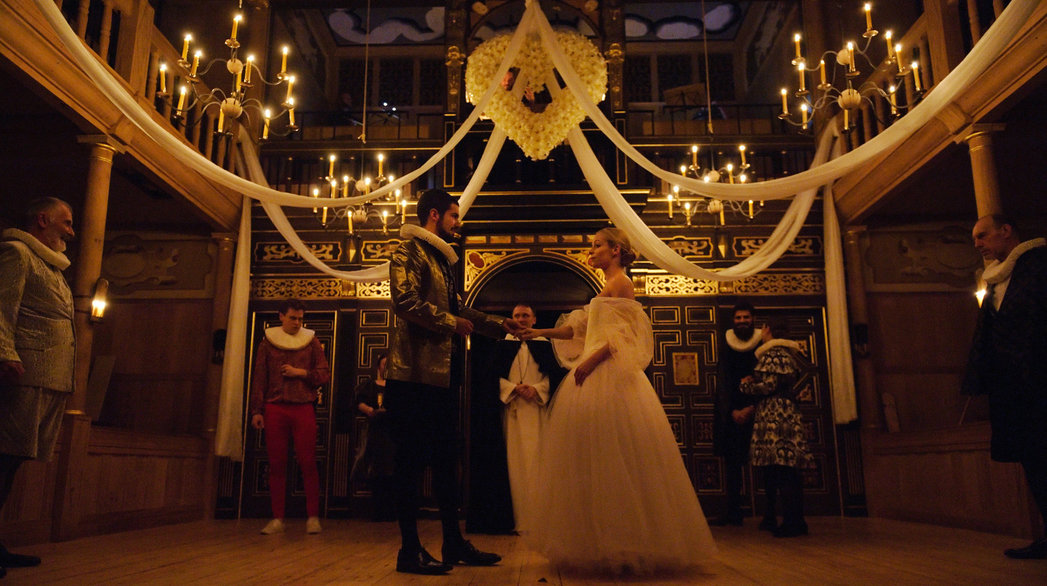'Tis Pity She's a Whore, Sam Wanamaker Playhouse | reviews, news & interviews
'Tis Pity She's a Whore, Sam Wanamaker Playhouse
'Tis Pity She's a Whore, Sam Wanamaker Playhouse
Pints of blood but no real tragedy in this season opener

So TFL have banned the Globe’s posters for ‘Tis Pity She’s a Whore for being too racy. What a gift. They couldn’t have given the production a better advertising boost if they’d covered every single one of their thousands of billboards with the barely-naked bodies of the show’s two attractive young leads. John Ford – still shocking audiences and sticking two bloody fingers up at the censors 400 years later. Well played.
And anyone who goes to Michael Longhurst’s new production for gore and erotic taboos will certainly get their fill. There’s nothing coy about the incestuous relationship between brother and sister Giovanni (Max Bennett) and Annabella (Fiona Button), who couple urgently and nakedly just feet away from the audience. The famous entrance involving a human heart impaled on a dagger is every bit as confronting, the centrepiece of a drama that spurts and oozes with pints of fake blood. Those who fainted at the Globe’s Titus earlier this year are going to wish they hadn’t peaked so soon.
This is revenge tragedy in its death throes
But no amount of sensation can distract from the quiet lack at the heart of the play itself – an organ as limply lifeless as Annabella’s own. To set it in context, ‘Tis Pity was probably written some 30 years after Shakespeare’s Titus, perhaps 15 after last season’s Wanamaker opener The Duchess of Malfi and potentially 50 after The Spanish Tragedy. This is revenge tragedy in its death throes, a drama desperately trying to up the ante for an audience numbed to all possible horrors, and losing its footing in the process.
 Longhurst has made his name in contemporary theatre and new writing, and here seems unsure what to do when his traditional dramatic “conversation with the writer” has to take place across a divide of centuries. Judging by designer Alex Lowde’s costumes (Jacobean by way of Shoreditch), his intention is to sharpen the tragedy’s edges with contemporary touches – a friction only heightened by the emphatic period faithfulness of the Wanamaker Playhouse itself. But it’s a half-hearted gesture. Cheek by Jowl showed us recently just how potent a slash-and-burn contemporary take on the text can be, and period naturalism might have been a more effective response than a diluted echo of a younger, funkier show.
Longhurst has made his name in contemporary theatre and new writing, and here seems unsure what to do when his traditional dramatic “conversation with the writer” has to take place across a divide of centuries. Judging by designer Alex Lowde’s costumes (Jacobean by way of Shoreditch), his intention is to sharpen the tragedy’s edges with contemporary touches – a friction only heightened by the emphatic period faithfulness of the Wanamaker Playhouse itself. But it’s a half-hearted gesture. Cheek by Jowl showed us recently just how potent a slash-and-burn contemporary take on the text can be, and period naturalism might have been a more effective response than a diluted echo of a younger, funkier show.
 But even if Longhurst’s desire “to avoid historical re-enactment” blunts aspects of drama and music (Simon Slater’s score – a Mass setting whose movements slot between scenes – is an uneasy mishmash of styles), his cast still generate some striking moments. The energy between Button (pictured left) and Bennett in the early scenes is unusually fresh, a romping innocence that turns the screw on a tragedy that sets morality on its head, exposing the sincerity and beauty of an incestuous love while damning church and state alike. If Button’s sudden assurance, her cold defiance of Soranzo (Stefano Braschi), seems to come from nowhere, then it’s a suddenness echoed in the text.
But even if Longhurst’s desire “to avoid historical re-enactment” blunts aspects of drama and music (Simon Slater’s score – a Mass setting whose movements slot between scenes – is an uneasy mishmash of styles), his cast still generate some striking moments. The energy between Button (pictured left) and Bennett in the early scenes is unusually fresh, a romping innocence that turns the screw on a tragedy that sets morality on its head, exposing the sincerity and beauty of an incestuous love while damning church and state alike. If Button’s sudden assurance, her cold defiance of Soranzo (Stefano Braschi), seems to come from nowhere, then it’s a suddenness echoed in the text.
James Garnon, here in full comic spate, runs riot through the centre of the drama with his brilliance, risking rebalancing the drama with his Woosterish Bergetto, and elevating sub-plot to central drama. Bergetto’s death (like the Malfi murder last season) benefits from the complete darkness of this space, transforming an unlikely mistaken-identity stabbing into something horribly plausible. A late shift to the role of Cardinal gives Garnon the final word, wringing every oozing drop of self-serving, hypocritical ambition from the titular line.
Philip Cumbus’s Vasquez is deliciously banal, a villain in no hurry to search for a motive, and whose violence is all the more terrifying for being so carefully considered. His natural foil is devoted-but-dim Poggio (Dean Nolan), a retainer whose warmth is unexpectedly matched by his wriggling hips in the final ensemble caper.
‘Tis Pity marks the start of the second season at the Sam Wanamaker Playhouse, and the space has lost none of its charged intimacy. What it lacked last night was a director prepared to work with that rather than against its character. The close-set walls of the Wanamaker can frame, embrace or invite as much as they can imprison or entrap. Longhurst’s drama spends too much time trying to break free of confines that don’t exist using the rather blunt weapon of Ford’s tragedy. By the end of the evening there’s barely a dent in the wooden theatre, and still less of one in our emotions.
- 'Tis Pity She's a Whore at the Sam Wanamaker Playhouse until 7 December 2014
rating
Explore topics
Share this article
The future of Arts Journalism
You can stop theartsdesk.com closing!
We urgently need financing to survive. Our fundraising drive has thus far raised £49,000 but we need to reach £100,000 or we will be forced to close. Please contribute here: https://gofund.me/c3f6033d
And if you can forward this information to anyone who might assist, we’d be grateful.

Subscribe to theartsdesk.com
Thank you for continuing to read our work on theartsdesk.com. For unlimited access to every article in its entirety, including our archive of more than 15,000 pieces, we're asking for £5 per month or £40 per year. We feel it's a very good deal, and hope you do too.
To take a subscription now simply click here.
And if you're looking for that extra gift for a friend or family member, why not treat them to a theartsdesk.com gift subscription?
more Theatre
 Interview, Riverside Studios review - old media vs new in sparky scrap between generations
Robert Sean Leonard and Paten Hughes make worthy sparring partners
Interview, Riverside Studios review - old media vs new in sparky scrap between generations
Robert Sean Leonard and Paten Hughes make worthy sparring partners
 Fat Ham, RSC, Stratford review - it's Hamlet Jim, but not as we know it
An entertaining, positive and contemporary blast!
Fat Ham, RSC, Stratford review - it's Hamlet Jim, but not as we know it
An entertaining, positive and contemporary blast!
 Juniper Blood, Donmar Warehouse review - where ideas and ideals rule the roost
Mike Bartlett’s new state-of-the-agricultural-nation play is beautifully performed
Juniper Blood, Donmar Warehouse review - where ideas and ideals rule the roost
Mike Bartlett’s new state-of-the-agricultural-nation play is beautifully performed
 The Gathered Leaves, Park Theatre review - dated script lifted by nuanced characterisation
The actors skilfully evoke the claustrophobia of family members trying to fake togetherness
The Gathered Leaves, Park Theatre review - dated script lifted by nuanced characterisation
The actors skilfully evoke the claustrophobia of family members trying to fake togetherness
 As You Like It: A Radical Retelling, Edinburgh International Festival 2025 review - breathtakingly audacious, deeply shocking
A cunning ruse leaves audiences facing their own privilege and complicity in Cliff Cardinal's bold theatrical creation
As You Like It: A Radical Retelling, Edinburgh International Festival 2025 review - breathtakingly audacious, deeply shocking
A cunning ruse leaves audiences facing their own privilege and complicity in Cliff Cardinal's bold theatrical creation
 Edinburgh Fringe 2025 reviews: Refuse / Terry's / Sugar
A Ukrainian bin man, an unseen used car dealer and every daddy's dream twink in three contrasting Fringe shows
Edinburgh Fringe 2025 reviews: Refuse / Terry's / Sugar
A Ukrainian bin man, an unseen used car dealer and every daddy's dream twink in three contrasting Fringe shows
 Faustus in Africa!, Edinburgh International Festival 2025 review - deeply flawed
Bringing the Faust legend to comment on colonialism produces bewildering results
Faustus in Africa!, Edinburgh International Festival 2025 review - deeply flawed
Bringing the Faust legend to comment on colonialism produces bewildering results
 Edinburgh Fringe 2025 reviews: Imprints / Courier
A slippery show about memory and a rug-pulling Deliveroo comedy in the latest from the Edinburgh Fringe
Edinburgh Fringe 2025 reviews: Imprints / Courier
A slippery show about memory and a rug-pulling Deliveroo comedy in the latest from the Edinburgh Fringe
 Edinburgh Fringe 2025 reviews: The Ode Islands / Delusions and Grandeur / Shame Show
Experimental digital performance art, classical insights and gay shame in three strong Fringe shows
Edinburgh Fringe 2025 reviews: The Ode Islands / Delusions and Grandeur / Shame Show
Experimental digital performance art, classical insights and gay shame in three strong Fringe shows
 Edinburgh Fringe 2025 reviews: Ordinary Decent Criminal / Insiders
Two dramas on prison life offer contrasting perspectives but a similar sense of compassion
Edinburgh Fringe 2025 reviews: Ordinary Decent Criminal / Insiders
Two dramas on prison life offer contrasting perspectives but a similar sense of compassion
 Edinburgh Fringe 2025 reviews: Kinder / Shunga Alert / Clean Your Plate!
From drag to Japanese erotica via a French cookery show, three of the Fringe's more unusual offerings
Edinburgh Fringe 2025 reviews: Kinder / Shunga Alert / Clean Your Plate!
From drag to Japanese erotica via a French cookery show, three of the Fringe's more unusual offerings
 The Two Gentlemen of Verona, RSC, Stratford review - not quite the intended gateway drug to Shakespeare
Shakespeare trying out lots of ideas that were to bear fruit in the future
The Two Gentlemen of Verona, RSC, Stratford review - not quite the intended gateway drug to Shakespeare
Shakespeare trying out lots of ideas that were to bear fruit in the future

Add comment